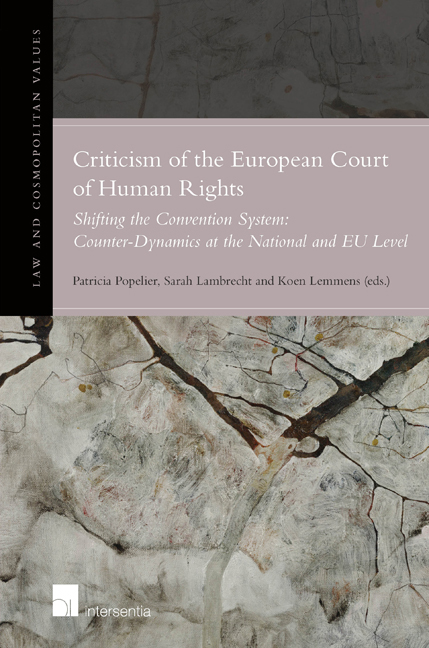 Criticism of the European Court of Human Rights
Criticism of the European Court of Human Rights from PART IV - STRONG CRITICISM
Published online by Cambridge University Press: 13 December 2017
CRITICISM OF THE EUROPEAN COURT OF HUMAN RIGHTS
Though the United Kingdom has been a member state of the Council of Europe since 1951, and has permitted the right of individual petition before the European Court of Human Rights since 1966, ‘the Convention rights’ have only been enforceable at the domestic level since 2000, when the Human Rights Act 1998 (hereafter HRA) came into effect across the UK. In the short period during which the Convention rights have been directly applicable in domestic litigation – in defining the contours of legal action taken by public authorities and as tools capable of tempering the requirements of rights-infringing legislation – the Convention and the European Court of Human Rights have become somewhat notorious in political discourse in the UK. It has become commonplace for the European Court of Human Rights to be accused of overreach, of utilising the ‘living instrument’ doctrine to develop the Convention's protections illegitimately and, as a consequence, of increasingly interfering with national sovereignty. If the enactment of the HRA in 1998 amounted to a radical reformation in the UK's approach to legally enforceable rights – through ‘bringing rights home’ and giving them effect in domestic courts for the first time – a counter-reformation is now, only 15 years later, very firmly in progress.
The recent upsurge in criticism of the Convention rights and of the European Court of Human Rights can undoubtedly be traced back to the 1998 enactment of the HRA. Prior to the HRA coming into effect across the UK, the dualist nature of the constitution largely precluded direct reliance on the Convention rights in domestic law. As Lord Donaldson starkly noted in the then leading decision of Brind:
…the duty of the English Courts is to decide disputes in accordance with English domestic law as it is, and not as it would be if full effect were given to this country's obligations under the Treaty … It follows from this that in most cases the English courts will be wholly unconcerned with the terms of the Convention.
To save this book to your Kindle, first ensure [email protected] is added to your Approved Personal Document E-mail List under your Personal Document Settings on the Manage Your Content and Devices page of your Amazon account. Then enter the ‘name’ part of your Kindle email address below. Find out more about saving to your Kindle.
Note you can select to save to either the @free.kindle.com or @kindle.com variations. ‘@free.kindle.com’ emails are free but can only be saved to your device when it is connected to wi-fi. ‘@kindle.com’ emails can be delivered even when you are not connected to wi-fi, but note that service fees apply.
Find out more about the Kindle Personal Document Service.
To save content items to your account, please confirm that you agree to abide by our usage policies. If this is the first time you use this feature, you will be asked to authorise Cambridge Core to connect with your account. Find out more about saving content to Dropbox.
To save content items to your account, please confirm that you agree to abide by our usage policies. If this is the first time you use this feature, you will be asked to authorise Cambridge Core to connect with your account. Find out more about saving content to Google Drive.